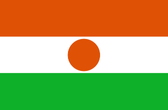
Call 0330 880 3600 Calls may be monitored or recorded. Opening Times.
- TRAVEL INSURANCE
- MEDICAL CONDITIONS
- More Options
- Help & Advice
- Existing Customers

Call 0330 880 3600 Calls may be monitored or recorded. Opening Times.

Need help?
UK Customer Services0330 880 3600*
Open Monday to Friday 9:00am to 6pm, Saturday 8:30am to 4pm and closed Sundays.
*Calls are recorded for training and quality purposes.

Official name: Republic of Niger
Capital city: Niamey
Languages spoken: French Hausa, Zarma
Population: Around 27 million
Currency: West African CFA franc (XOF)
Time zone: GMT+1
Driving side: Right
Climate: Hot and arid, with searing desert temperatures in the north and short rainy seasons in the south; dust storms are common during the dry months
Niger is a vast, landlocked country in West Africa dominated by the Sahara Desert. It has a rich history of ancient trade routes and nomadic cultures, though today it faces serious challenges, including poverty, political instability, and security risks linked to extremist groups operating in the wider Sahel region. Despite these issues, Niger’s landscapes, from desert dunes to the Niger River valley, reveal a striking natural beauty.
Niger shares borders with seven countries: Algeria, Libya, Chad, Nigeria, Benin, Burkina Faso, and Mali. Much of the north is covered by the Sahara, while the southern belt is more fertile, supporting agriculture along the Niger River. The Aïr Mountains in the north rise dramatically from the desert, offering a unique geological landscape.
International flights generally arrive at Diori Hamani International Airport in Niamey. Overland travel is possible but can be hazardous due to poor road conditions, banditry, and security concerns. Public transport is limited, and many visitors rely on private vehicles or organised tours with local guides.
Most visitors, including UK citizens, need a visa to enter Niger, which should be obtained in advance. A valid passport with at least six months’ validity is required, and proof of yellow fever vaccination is mandatory. The British Embassy in Niamey provides consular assistance.
The West African CFA franc (XOF), shared with several neighbouring countries, is the official currency. Cash is essential, as credit card facilities are scarce outside major hotels. ATMs are limited to larger cities like Niamey, and they are not always reliable, so travellers should bring sufficient funds in euros or US dollars to exchange.
Healthcare in Niger is very limited, especially outside Niamey. Facilities often lack equipment, medicines, and trained staff, and serious conditions may require medical evacuation. Malaria is widespread, particularly in the south, and travellers should take prophylaxis and mosquito precautions. Yellow fever vaccination is required for entry. Tap water is unsafe to drink, so bottled or boiled water is essential. Comprehensive insurance with evacuation cover is strongly recommended.